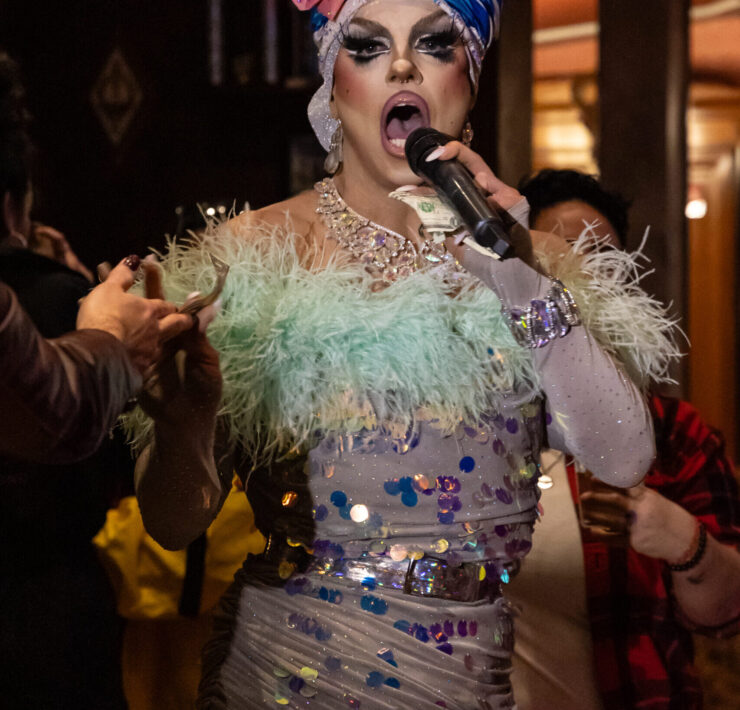Club Q Support Group Facilitates a Safe Space for Healing

Kendall McClain (she/her) is an editorial intern from the Department…
The Club Q support group, hosted by the Club Q impact team of Diverseus Health, creates a safe space for healing and community.
Diverseus Health works to provide varying mental and behavioral health care in Colorado. They are now offering a Club Q support group in light of the tragic shooting at Club Q on November 19, 2022. The support group centers on community wellness and healing. When asked what The Club Q support group entails, Tammy Laborde, the overseer of the Club Q outreach team, says, “We offer mental health services to people who were impacted by Club Q. So that could be primary, secondary, or tertiary victims, but also the community at large; it appears that there needs to be some healing within that community, especially when mass violence happens. So we do offer free mental health services; we have a point five clinician here that is very well versed in trauma, and especially when it comes to mass violence.”
The support group incorporates the PCL-5 checklist to address and eventually overcome trauma and its effects. Laborde explains how this works: “In therapy, we have what we call a PCL five, and that PCL five really rates, what their traumatic experience has been, and what emotions and feelings are having. So we’re trying to really hone in on that traumatic event, and hopefully reduce some of that anxiety, the depression, at least by the sixth session. That’s what our goal is—to see a decline in the PCL five.”
The Club Q support group emphasizes community, with a portion of their services centering on members’ relationships with peers. Laborde explains what a peer means in The Club Q Support group, saying, “How to define a peer is almost like a professional friend. It’s, ‘I have lived experience with some things out there such as grief, such as trauma, suicidal ideation;’ those peers meet the client where they’re at.”
The support group currently has four peers, and this relationship expands past mental health buildings that can often be initially daunting. Tammy says, “The peers will meet the clients where they’re at, typically, it could be, like, in a park, and maybe we’re gonna walk, and we’re going to talk about your wellness and what your wellness goals are, and how is it that we can help to achieve those goals together.”
They work with those affected while also facilitating change in the community. They have presentations regarding trauma and resiliency, and present to companies to help inform them on trauma-informed care and how good allyship looks both in communities and workspaces.
An aspect of facilitating change in the community is helping share safe spaces for queer people. For example, Labrode mentions Inside Out, saying, “They’re a pride-friendly Youth Center here in Colorado Springs. And they’re upcoming; they’re going to be the adults in the pride community at some point.”
The Club Q support group intends to facilitate healing that can help victims return to things they enjoyed before the shooting occurred. Labrode speaks on their ultimate goal, saying, “We would like to see happen is some type of level of functioning that the clients have had before the tragedy occurred.” They especially encourage this kind of healing through easy accessibility that eradicates stress from seeking help.
Joining the support group is free, and the group bypasses common difficulties regarding seeking help. Labrode explains what the starting process of the support group entails. She says, “Accessibility is very important to us. So we bypass that entire process there. They will come in and meet with a peer; the peer will do a soft to open into the system. And then if they want clinical services, they will meet with the clinician the same day. Yeah, we’ve bypassed everything.” With their emphasis on accessibility, the support group, which meets biweekly on Tuesdays, is open and easily available to all impacted by the tragedy.
When asked about the future of the Club Q support group, Labrode says that their grant has been extended for “11 more months. So I’m really proud of that, that we have 11 months to help to try to facilitate change. We can’t make change, but we can help facilitate it in the community, so I am happy.”
The Club Q support group offers many paths to healing, ultimately with the goal of a sense of normalcy and comfort in everyday life.
Graphic courtesy of Diversus Health
What's Your Reaction?
Kendall McClain (she/her) is an editorial intern from the Department of English at CU Boulder. She enjoys literature, drawing, and black cats.










